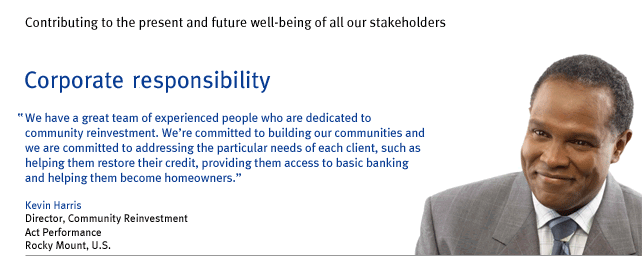Environmental sustainability
We believe that sustained economic growth and a healthy environment are inextricably linked.We take a leading industry role in supporting and advocating sustainable business practices in terms of providing financial services, especially credit, as well as minimizing our environmental footprint in our own facilities and operations.
Community engagement
We believe in building prosperity by supporting a broad range of causes. In 2005, we contributed more than $65 million to community causes worldwide, through donations of more than $40.6 million, and an additional $25 million in the support and sponsorship of community events and national organizations. Our employees and pensioners also make an enormous contribution as volunteers, sharing their financial and business knowledge, time and enthusiasm with thousands of community groups.
Our approach to non-financial reporting
For more than 500 years, the traditional method of reporting financial results has been the “single bottom line” approach, which takes into account a company’s assets and liabilities, with the shareholder as the company’s main focus.
But since the 1990s, there has been an emerging recognition that there are “hidden” liabilities and assets on a company’s balance sheet. Or, to put it another way, shareholders are recognizing that there is more to a company than meets the eye in its quarterly financials.
Increasingly, companies are being asked by investors, analysts and clients to report on their environmental and social performance. This non-financial or sustainability reporting is an emerging discipline, with a great deal of debate among various stakeholders about which performance indicators are the most relevant.
As such, we have not formally adopted a single approach to non-financial reporting; rather, we pay attention to a number of guidelines, frameworks and best practices, and regularly consult with experts to help us understand emerging trends. We have committed to taking a leadership role in helping develop non-financial reporting standards through our work with the Global Reporting Initiative.
Our non-financial reporting can be found in:
| • |
Our Annual Report and Proxy Statements, which cover our corporate profile, highlights of our financial performance, as well as our approach to risk management, corporate governance and disclosure of executive compensation. |
| • |
Our annual Corporate Responsibility Report, which gives a high-level overview of our social and environmental performance relative to clients, employees, communities and the economy. It includes a description of our business practices, as well as our approach to providing financial services. In Canada, this publication includes our Public Accountability Statement, outlining our contribution to society and the economy, as required by Canadian law. |
| • |
Our online Sustainability Report (on rbc.com), which provides the most detailed information on sustainability performance indicators that have been deemed significant by researchers and analysts, and is organized to align with the Sustainability Reporting Guidelines of the Global Reporting Initiative. This online report is updated on an ongoing basis, ensuring our corporate responsibility efforts are as transparent as possible while still respecting the privacy of our clients and preserving proprietary marketing information. |
| • |
A number of our sites on rbc.com provide ongoing detail about topics that fall under the corporate responsibility umbrella, including Governance, Human Resources (Careers), Environment, Purchasing, Donations and Sponsorships. For a full overview of our approach to corporate responsibility, see rbc.com. |
|
